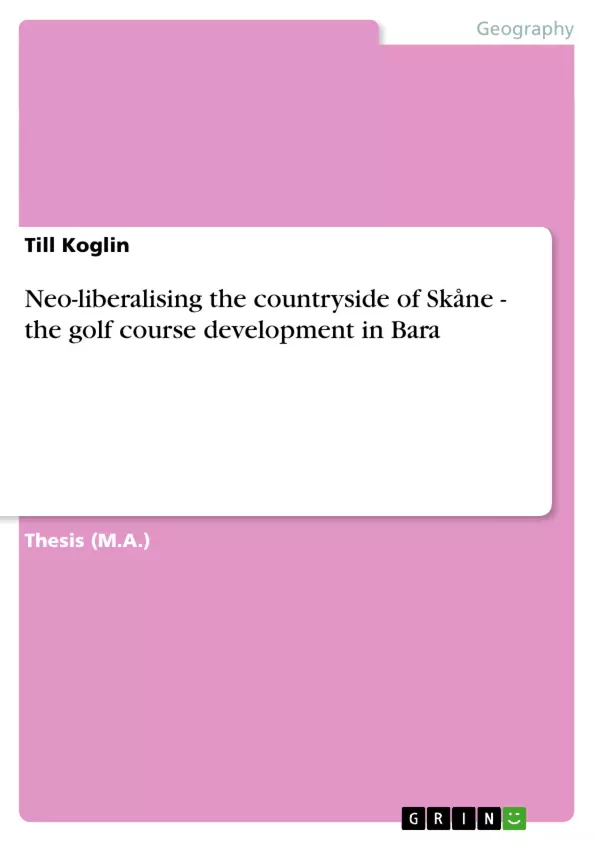This thesis is a qualitative study of the golf course development in the village of Bara in Skåne. The focus of the analysis is on sustainability, neo-liberalism and planning. It is focused on two themes, namely use of place, which involves aspects of social sustainability, neo-liberalism and planning and impacts on the environment/landscape, which involves ecological sustainability and planning/traffic planning issues. Different theories are used in order to analyse the two themes in the context of the golf course development in Bara. The theories used here are built on academic literature about social and ecological sustainability, planning theory and neo-liberalism. Perkins’ theory of commodification of rural spaces, Selberg’s model of less impact in the environment by traffic, Clokes and Lapping’s theoretical aspects of planning and rural planning, Chan and Lee’s theory on social sustainability and Marsden’s and Buttel’s theory on rural sustainability are of special interest in this thesis. The development in Bara is strongly connected to the local environment and to aspects of economic development. It is therefore important to investigate this kind of rural development to see what impact it has on the environmental and social aspects in Bara.
Inhaltsverzeichnis (Table of Contents)
- 1 Introduction
- 1.1 Structure of this magister thesis
- 1.2 Aim of this thesis
- 1.3 Delimitations
- 1.4 Methods and material
- 2 Background – the village of Bara and the golf course development
- 3 General theoretical approaches for analysing rurality
- 4 Theoretical background of this thesis
- 4.1 Neo-liberalism – introduction and theoretical background
- 4.2 The concept of sustainability – social and ecological sustainability in rural spaces
- 4.3 Theoretical approaches on rural planning and traffic planning
- 5 Analysing the rural development in the village of Bara
- 5.1 The development in Bara – neo-liberalism in the countryside of Skåne or where is the social sustainability?
- 5.2 Environmental aspects, the case of traffic and ecological sustainability in the planning of the Bara golf course
Zielsetzung und Themenschwerpunkte (Objectives and Key Themes)
The aim of this thesis is to explore the environmental impacts of golf course development, particularly the impact of new roads and increased traffic, in the village of Bara, Skåne. The author investigates the shift in land use in Bara and similar rural developments in Skåne. The thesis connects these developments to different aspects of sustainability, particularly the environmental and social aspects. Key themes include:- The influence of neo-liberalism on rural development
- The relationship between neo-liberalism and social sustainability
- The ecological and environmental impact of the development
- The role of traffic planning in environmental sustainability
- The potential for sustainable rural development in the context of golf course development.
Zusammenfassung der Kapitel (Chapter Summaries)
- Chapter 1: Introduction This chapter introduces the subject of the thesis, outlining its aim and delimitations. The author discusses the lack of research on golf course development in rural areas and the particular significance of the case of Bara in Skåne.
- Chapter 2: Background This chapter provides background information on the village of Bara and the history of the golf course development project. It describes the existing economic and social structure of the village, the proposed development plans, and the potential impact of the project on the environment and the local landscape.
- Chapter 3: General Theoretical Approaches This chapter outlines general theoretical approaches used to analyze rurality, focusing on the cultural turn and rural hybridities, as well as critical social theory.
- Chapter 4: Theoretical Background This chapter delves into the theoretical concepts relevant to the analysis of the development in Bara, including neo-liberalism, sustainability, rural planning, and traffic planning.
- Chapter 5: Analyzing the Rural Development in Bara This chapter analyzes the empirical data gathered from interviews and plans, focusing on the influence of neo-liberalism on the development and the challenges to social sustainability. The author explores the commodification of the countryside, the impact on the landscape, and the role of public-private partnerships.
Schlüsselwörter (Keywords)
The thesis focuses on the themes of neo-liberalism, sustainability, rural development, planning, traffic planning, and golf course development. It critically examines the impact of these factors on the village of Bara in Skåne, highlighting the challenges of achieving sustainable development in rural areas.Frequently Asked Questions
What is the main focus of the study on Bara?
The thesis explores the environmental and social impacts of golf course development in the village of Bara, Skåne, through the lens of neo-liberalism and sustainability.
How does neo-liberalism affect rural development?
The study analyzes how neo-liberal policies lead to the commodification of rural spaces, often prioritizing economic growth over social and ecological sustainability.
What environmental concerns are raised regarding the golf course?
Key concerns include changes to the landscape, ecological sustainability, and specifically the impact of increased traffic and new road planning.
What is "social sustainability" in this context?
It refers to the impact on the local community's social structure and the use of place, questioning whether the development benefits or excludes local residents.
Which theories are used in the analysis?
The thesis utilizes theories on the commodification of rural spaces (Perkins), social sustainability (Chan and Lee), and rural planning (Cloke and Lapping).
Why is traffic planning significant in this study?
Traffic planning is a major factor in environmental sustainability, as the development in Bara necessitates infrastructure changes that alter the rural environment.
- Quote paper
- MA Till Koglin (Author), 2008, Neo-liberalising the countryside of Skåne - the golf course development in Bara, Munich, GRIN Verlag, https://www.grin.com/document/115196



